Donkeys, like other equids such as horses, are herbivorous animals, which means that their diet is based exclusively on plant-based foods such as grass.
This is where they get all the protein and fiber they need for their sustenance, keeping them strong and healthy.
But, how do you know how much a donkey eats? And what are its eating habits? In this article, we will explain more about donkey feeding.
How much does a donkey eat?
It has been found that a donkey eats the equivalent of 1.3-1.8% of its body weight of dry feed per day: for a donkey weighing about 180 kg, this is equivalent to 2.3-3.1 kg of feed. For a healthy donkey, this feed should consist entirely of good-quality fibers such as hay and straw.
Therefore, a small-sized donkey of about 150 kg needs approximately 1.5 kg of hay per day, which in green would be 7.5 kg of fresh grass.
For a 100 kg donkey engaged in simpler tasks, this is equivalent to 1.25 units of fodder and 80 g of digestible protein.
How many times a day should I feed a donkey?
Donkeys need to eat small amounts of food at regular intervals. The size of the donkey’s stomach is small, so feed it 3-4 times a day. In the wild, they eat small amounts of fiber-rich plants throughout the day.
It is easy to notice how much a donkey eats. If you have an excess amount of protein in the donkey’s feed, severe diarrhea can occur in some cases and it will be quite difficult to control.
If you keep donkeys on farms, avoid feeding them cereals such as oats, wheat, and corn as these contain very high levels of starch and sugar, which can damage the donkey’s digestive tract.
It is important that their food is low in sugars and high in fiber to ensure their health.
But if you want to reward your donkey sporadically, you can do it with some treats such as carrot, apple, banana (with peel included), or mint leaves.
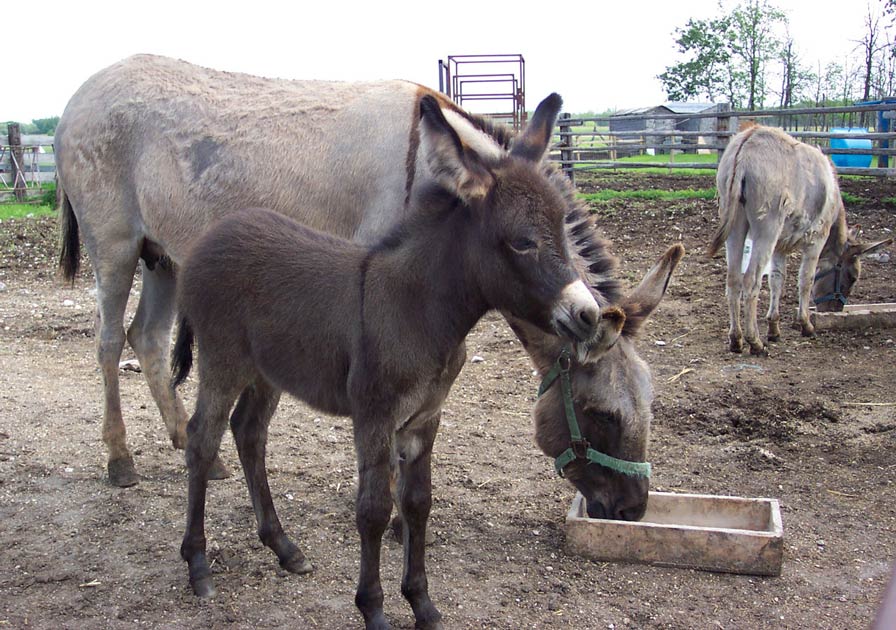
What does a donkey eat?
Generally, healthy and fit donkeys do well on a diet of straw, grass, and hay. Oat straw has a higher caloric content and is only suitable for older donkeys, whole wheat straw is better for a young donkey with strong teeth to eat it.
Pasture or forage is part of the green matter that donkeys should consume daily and several times a day, both of which provide fiber and help maintain a healthy digestive tract and help maintain a good level of healthy bacterial flora.
However, grass should not be the only source of food, as it is poor in some nutrients such as vitamins.
For example, forage should be accompanied by a supplement of vitamins and minerals to correct the deficiencies as well as a daily salt intake in addition to the ad libitum block.
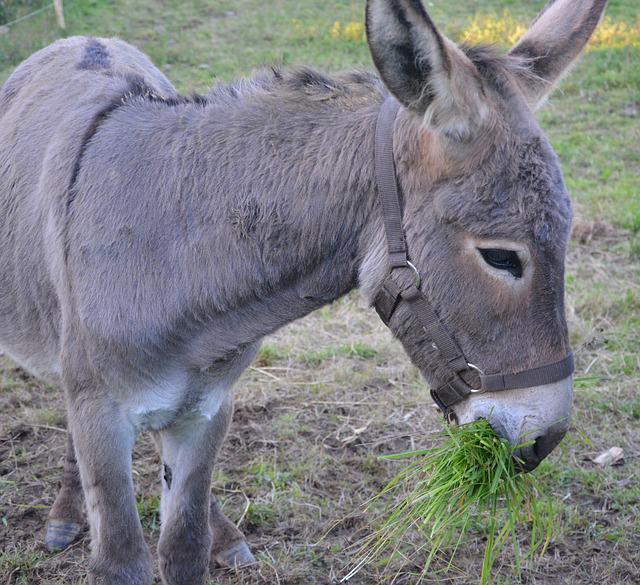
They do not need to consume as much feed as other animals
Unlike horses and mules, donkeys have an efficient metabolism and therefore require less energy than other equines. But it is necessary to watch what they eat as a diet in excess of grass can make the donkeys obese.
Obesity is a concern because once a donkey turns into a roll of fat, it will probably never go away.
You can offer supplemental hay to your donkeys in case their weight is not adequate with their usual diet, especially during the winter months.
If you wish to change the diet of your donkeys, it should be done gradually, approximately during a couple of weeks.
Watch what your donkey eats
It is important to know what your donkey eats because certain plants can be harmful to them. Plants such as yew, ragwort, acorns, oak leaves, and red maple leaves could be toxic to donkeys.
Do not feed them leftovers from your meals as donkeys have difficulty digesting many human foods such as broccoli, cauliflower, potatoes, onions, eggplant, tomatoes, garlic, and peppers.
Also do not feed them processed foods such as cookies, chocolates, cakes, or cookies.
If you have a farm or trees nearby, be careful with trees such as oaks. You should avoid the donkeys feeding on their leaves, as they are highly toxic to them. The same goes for acorns and red maple leaves.
Access to water is also very important so that the animals can stay hydrated at all times. Ideally, they should have free access to it throughout the day and place it in the shade, so that it is always cool.
The diet of donkeys is not a complicated process if you have proper control of the ingredients that make up the diet. On many farms, donkeys are left to graze much of the day and they are supplemented with hay or special grass containing fiber, vitamins, and minerals, to supplement the daily requirements.
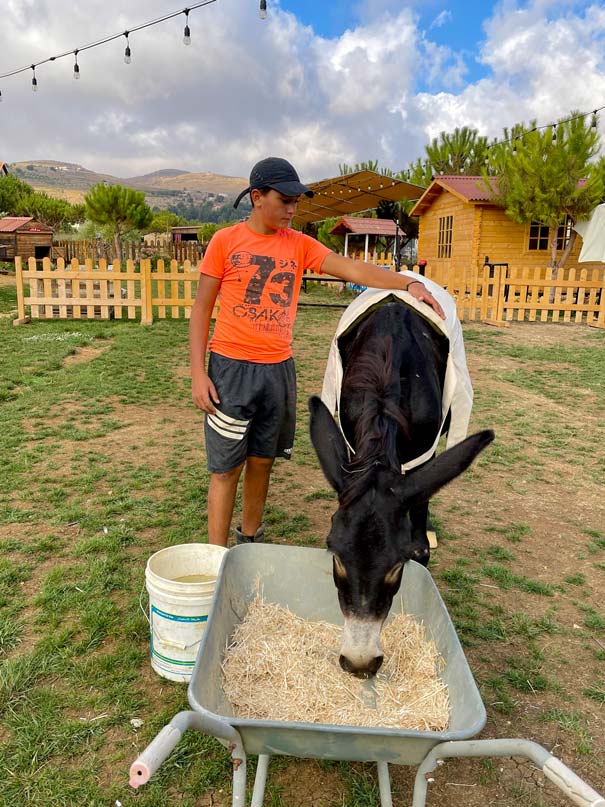
Final Words
If you own donkeys or if you are planning to get one, having a proper feeding plan is very important. They need a diet that is 100% appropriate for their age and state of health. The amount of hay or straw to give a donkey depends largely on the size and body condition of the animal.
Make regular assessments of your donkey’s body condition and monitor changes in his diet, and in case of any questions about his diet, consult your veterinarian.
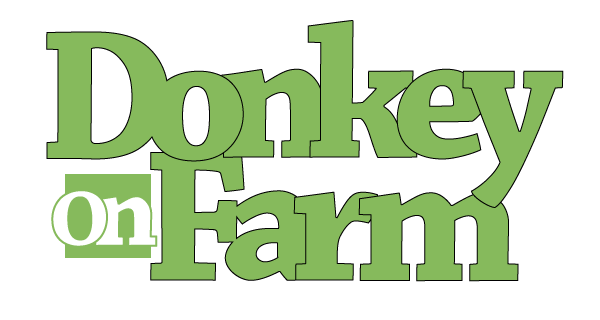
![How Much Does a Donkey Eat? [Plus Feeding Tips] How-much-does-a-donkey-eat](https://donkeyonfarm.com/wp-content/uploads/2022/04/How-much-does-a-donkey-eat.jpg)

![Do Donkeys Laugh? [Plus Why Do They Do It?] do-donkeys-laugh](https://donkeyonfarm.com/wp-content/uploads/2022/08/Why-do-donkeys-laugh-270x180.jpg)
![How to Get Rid of Flies on Your Donkey? [Plus Prevention Methods] How to Get Rid of Flies on your Donkey](https://donkeyonfarm.com/wp-content/uploads/2022/05/How-to-Get-Rid-of-Flies-on-your-Donkey-270x180.jpg)
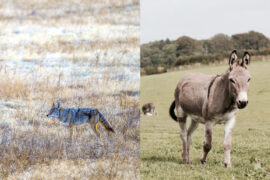
![Should Donkeys Be Stabled at Night? [With Alternatives to a Stable] Should-donkeys-be-stabled-at-night](https://donkeyonfarm.com/wp-content/uploads/2023/04/Should-donkeys-be-stabled-at-night-270x180.jpg)